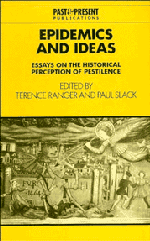Book contents
- Frontmatter
- Contents
- Contributors
- Preface
- 1 Introduction
- 2 Epidemic, ideas and classical Athenian society
- 3 Disease, dragons and saints: the management of epidemics in the Dark Ages
- 4 Epidemic disease in formal and popular thought in early Islamic Society
- 5 Plague and perceptions of the poor in early modern Italy
- 6 Dearth, dirt and fever epidemics: rewriting the history of British ‘public health’, 1780–1850
- 7 Epidemics and revolutions: cholera in nineteenth-century Europe
- 8 Hawaiian depopulation as a model for the Amerindian experience
- 9 Plague panic and epidemic politics in India, 1896–1914
- 10 Plagues of beasts and men; prophetic responses to epidemic in eastern and southern Africa
- 11 Syphilis in colonial East and Central Africa: the social construction of an epidemic
- 12 The early years of AIDS in the United Kingdom 1981–6: historical perspectives
- Index
- Past and Present Publications
8 - Hawaiian depopulation as a model for the Amerindian experience
Published online by Cambridge University Press: 05 August 2011
- Frontmatter
- Contents
- Contributors
- Preface
- 1 Introduction
- 2 Epidemic, ideas and classical Athenian society
- 3 Disease, dragons and saints: the management of epidemics in the Dark Ages
- 4 Epidemic disease in formal and popular thought in early Islamic Society
- 5 Plague and perceptions of the poor in early modern Italy
- 6 Dearth, dirt and fever epidemics: rewriting the history of British ‘public health’, 1780–1850
- 7 Epidemics and revolutions: cholera in nineteenth-century Europe
- 8 Hawaiian depopulation as a model for the Amerindian experience
- 9 Plague panic and epidemic politics in India, 1896–1914
- 10 Plagues of beasts and men; prophetic responses to epidemic in eastern and southern Africa
- 11 Syphilis in colonial East and Central Africa: the social construction of an epidemic
- 12 The early years of AIDS in the United Kingdom 1981–6: historical perspectives
- Index
- Past and Present Publications
Summary
We are at the final frayed finish of the age of Europe's territorial expansion, which stimulates curiosity about its beginnings. The Social Darwinists were sure that white people were genetically superior to the other strains of humanity, and that was why they were such successful imperialists; at the end of the twentieth century that explanation seems as antiquated as a whalebone corset. Technological and managerial superiority are probably adequate to explain the brief subjugation of such lands as Algeria and Burma, but meagre when matched to the Europeans' much more thorough and seemingly permanent takeovers of the temperate regions of the Americas. The new right-off-the-shelf-and-ready-for-instant-use explanation is that the Amerindians, unlike Africans or Asians, died in huge numbers of Old World diseases carried for the first time across the Atlantic by Columbus and his emulators, and therefore were easily displaced and replaced by the invaders.
There is a large body of documentary evidence in support of this theory, but much of the evidence was collected in the pre-scientific and pre-statistical centuries and almost always by soldiers, missionaries, trappers and traders, rather than by physicians and demographers: i.e. it is no better than impressionistic. Furthermore, the enormous extent of the Americas, the number and variety of their aboriginal peoples and the length of time since the first contacts between the Old World invaders and the New World aborigines bring into question even the most obvious interpretations of what accounts we do have of the impact of exotic diseases on Amerindians.
- Type
- Chapter
- Information
- Epidemics and IdeasEssays on the Historical Perception of Pestilence, pp. 175 - 202Publisher: Cambridge University PressPrint publication year: 1992
- 11
- Cited by

